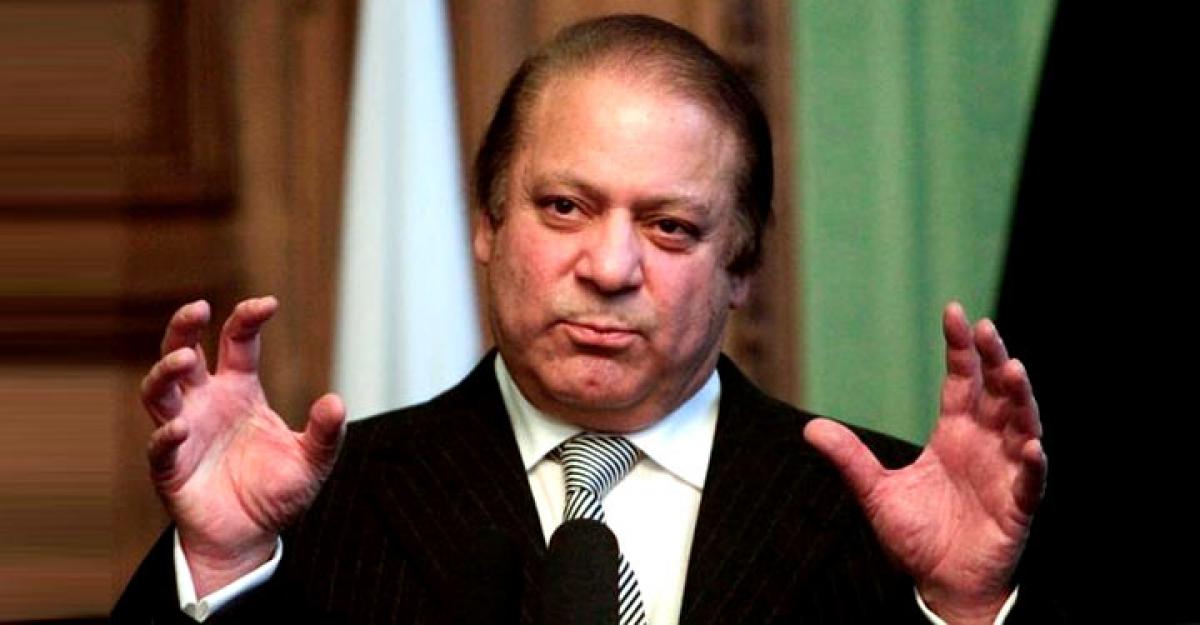Live
- Over 7,600 Syrians return from Turkiye in five days after Assad's downfall: minister
- Delhi BJP leaders stay overnight in 1,194 slum clusters
- Keerthy Suresh and Anthony Thattil Tie the Knot in a Christian Ceremony
- AAP, BJP making false promises to slum dwellers for votes: Delhi Congress
- 'Vere Level Office' Review: A Refreshing Take on Corporate Life with Humor and Heart
- Libya's oil company declares force majeure at key refinery following clashes
- Illegal Rohingyas: BJP seeks Assembly session to implement NRC in Delhi
- Philippines orders full evacuation amid possible volcanic re-eruption
- Government Prioritizes Welfare of the Poor, says Dola Sri Bala Veeranjaneyaswamy
- Two Russian oil tankers with 29 on board damaged due to bad weather
Just In

Pakistan Prime Minister Nawaz Sharif came to the US with a litany of complaints against India with the hope of getting an India type nuclear deal and involving Washington in the Kashmir issue. He got neither.
Washington: Pakistan Prime Minister Nawaz Sharif came to the US with a litany of complaints against India with the hope of getting an India type nuclear deal and involving Washington in the Kashmir issue. He got neither.
Instead Sharif ended up giving President Barack Obama an assurance that Islamabad would take effective action against Pakistan based terror outfit Lashkar-e-Taeba (LeT) and its affiliates responsible for the Nov 2008 Mumbai terror attack.
.jpg) Apparently concerned over Pakistan's assertion that it has made low-yield nuclear weapons to bridge the gap for war that India had created through its cold-start doctrine, Obama also cautioned Sharif against raising nuclear tensions with new weapons.
Apparently concerned over Pakistan's assertion that it has made low-yield nuclear weapons to bridge the gap for war that India had created through its cold-start doctrine, Obama also cautioned Sharif against raising nuclear tensions with new weapons.
"Regarding Pakistan's nuclear weapons programme, the President stressed the importance of avoiding any developments that might invite increased risk to nuclear safety, security, or strategic stability," a joint statement said.
However, Pakistan did manage to get a call for an India-Pakistan dialogue to resolve all issues including Kashmir included in a joint statement issued after Sharif met Obama Thursday in his Oval office in the White House.
But in line with Washington's hands off Kashmir policy, the joint statement expressing "concern over violence along the Line of Control (in Kashmir)" noted "their support for confidence-building measures and effective mechanisms that are acceptable to both parties."
"The leaders emphasised the importance of a sustained and resilient dialogue process between the two neighbours aimed at resolving all outstanding territorial and other disputes, including Kashmir, through peaceful means and working together to address mutual concerns of India and Pakistan regarding terrorism," it said.
"In this context, the Prime Minister apprised the President about Pakistan's resolve to take effective action against United Nations-designated terrorist individuals and entities, including Lashkar-e-Taeba (LeT) and its affiliates, as per its international commitments and obligations under UN Security Council resolutions and the Financial Action Task Force," the statement added.
Obama and Sharif, it said "stressed that improvement in Pakistan-India bilateral relations would greatly enhance prospects for lasting peace, stability, and prosperity in the region."
Sharif also "reaffirmed that Pakistan's territory will not be used against any other country and noted that this is an obligation of all countries in the region."
The Prime Minister, it said, "outlined the actions that Pakistan is taking under the National Action Plan to ensure that the Taliban - including the Haqqani Network - are unable to operate from the soil of Pakistan."
Asked later to compare India and Pakistan's respective concerns about terrorism, Obama's spokesman Eric Schultz parried saying, "I think it's clear that Pakistan's relationship with India is critical to Pakistan's future."
"The normalisation of relations between those two countries is vital both to them and to the stability in the region," he said stressing "economic linkages and a broader view of the US-Pakistan relationship beyond just counterterrorism."
"And I think it's discussions like the one the President had today that helps unlock opportunities for millions of people and leads to a more prosperous region, which no doubt will go a long way towards counterterrorism efforts," Schultz said.
Asked if the US was satisfied with counterterrorism actions that Pakistan is taking, including against the Haqqani Network and LeT, he said: "Pakistan has embarked on significant military operations that have had a significant impact."
"They've targeted terrorist sanctuaries and restored government-controlled parts of Pakistan that had previously been safe havens to terrorists for years," Schultz said.
"So we understand that the people of Pakistan have suffered greatly at the hands of terrorists and violent extremists, and we welcome Pakistan's commitment as part of its national action plan to not discriminate amongst terrorist groups," he said.
Without confirming or denying a New York Times report that US was planning to sell eight new F-16 fighter jets to Pakistan, Shultz said Obama did discuss with Sharif how the US and Pakistan can best continue their robust counterterrorism cooperation.
Meanwhile, a senior Administration official "categorically" ruled out any kind of negotiations with Pakistan on an India-type civil nuclear deal, terming the reports in American media as "completely false".
"Let me state categorically, we have not entered into negotiations on 123 Agreement with Pakistan nor are we seeking an exception for Pakistan within the nuclear supplier group in order to facilitate civil nuclear exports," said the official, speaking on condition of anonymity.

© 2024 Hyderabad Media House Limited/The Hans India. All rights reserved. Powered by hocalwire.com







